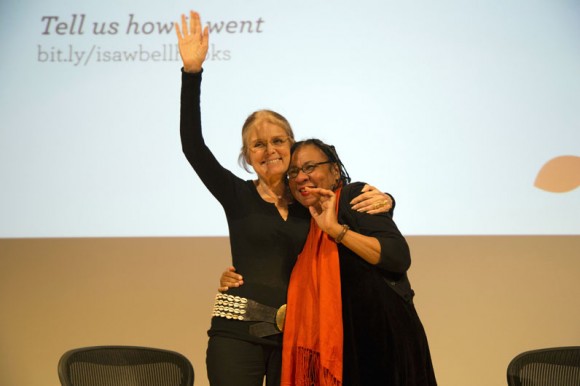For the first time in her life, bell hooks was having doubts about feminism—not about her commitment to it, but about the shape it has taken in our patriarchal system.
“Patriarchy has no gender, and I think we have to remember people’s allegiance to patriarchy isn’t static,” Dr. hooks, who was joined onstage by feminist leader Gloria Steinem, told the audience at the sold-out Tishman Auditorium Monday. “People can start out in feminism and end up in patriarchy.”
She added later, “Women have more economic power than ever, and yet we remain wedded to patriarchy in ways that are so unclear.”
At the start of her third residency at Eugene Lang College The New School for Liberal Arts, Dr. hooks, a leading voice in black feminism whose transformational and often provocative discussions on race, gender and spirituality have made waves at the university and beyond, picked up right where she left off after her last visit. In their nearly two-hour discussion, hooks and Steinem explored the ways feminism has—and has not—encouraged transgression of patriarchy, racism, religion and violence.
Dr. hooks was in good company with Steinem, one of the most recognizable faces of the women’s liberation movement, as well as hundreds of members of the New School community, who listened, laughed, and cheered during the gripping two-hour dialogue.
Heather O’Brien, who sat in for all of hooks’ residencies, was mesmerized by the 62-year-old firebrand.
“Dr. hooks is a very candid person—she’s never afraid to speak her mind—which makes for an engaging and inspirational discussion,” says O’Brien, executive assistant and communication manager to the provost at The New School, who worked with hooks to organize all three of the author’s residencies. “She calls on people to become engaged not only with the discussion but with these important issues that demand solutions.”
In the past, hooks has explored a broad range of topics, from the treatment of Black women in the media to the liberation of the Black female body to the oppressive nature of what she famously refers to as “the white supremacist capitalist patriarchy.” She’s stirred up some controversy as well.
Not surprisingly, hooks’ words have resonated with members of The New School community. The university, known for the excellence of its teaching and for its open intellectual environment, prides itself on taking risks, calling attention to social issues, and challenging the status quo.
“Dr. hooks’ work, and the thinking behind it, like education at The New School, are endlessly relevant, provocative, theoretically rigorous, and focused on social activism—like The New School itself,” says Stephanie Browner, dean of Eugene Lang College The New School for Liberal Arts.
Entitled Transgression, hooks’ fall residency brings her into conversation with several prominent figures. In addition to Steinem, the residency features discussions with Orange Is the New Black star and transgender rights advocate Laverne Cox this evening, public intellectual and philosopher Cornel West on Wednesday, and author and literary critic Samuel R. Delany on Thursday.
Like her most recent appearance, hooks’ previous two residencies at The New School generated a lot of buzz. The fall 2013 residency culminated in a widely viewed and shared public conversation with MSNBC’s Melissa Harris-Perry, which the Huffington Post called “riveting.” Altogether, The New School’s Livestream videos of hooks’ discussion have racked up more than 100,000 hits on YouTube.
Beginning with an intimate talk in The New School’s Orozco Room in fall 2013, hooks’ events have since expanded into the Tishman Auditorium, which was overflowing with members of the university community during her most recent visit. hooks has indeed found a second home at The New School.
“The values and ethos of The New School are very much in keeping with hooks’ own philosophy,” O’Brien says. “The New School has a strong commitment to civic engagement and social justice and a long tradition of embracing diversity, which are all key parts of her work. The connections she’s made with members of the faculty, staff, and students have been very powerful.”
Click here for a video of the event.
